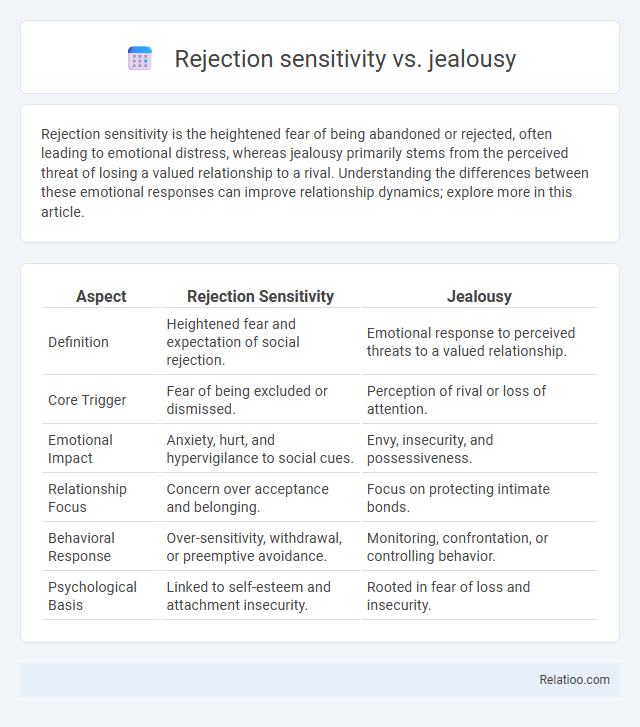Rejection sensitivity is the heightened fear of being abandoned or rejected, often leading to emotional distress, whereas jealousy primarily stems from the perceived threat of losing a valued relationship to a rival. Understanding the differences between these emotional responses can improve relationship dynamics; explore more in this article.
Table of Comparison
| Aspect | Rejection Sensitivity | Jealousy |
|---|---|---|
| Definition | Heightened fear and expectation of social rejection. | Emotional response to perceived threats to a valued relationship. |
| Core Trigger | Fear of being excluded or dismissed. | Perception of rival or loss of attention. |
| Emotional Impact | Anxiety, hurt, and hypervigilance to social cues. | Envy, insecurity, and possessiveness. |
| Relationship Focus | Concern over acceptance and belonging. | Focus on protecting intimate bonds. |
| Behavioral Response | Over-sensitivity, withdrawal, or preemptive avoidance. | Monitoring, confrontation, or controlling behavior. |
| Psychological Basis | Linked to self-esteem and attachment insecurity. | Rooted in fear of loss and insecurity. |
Understanding Rejection Sensitivity: Definition and Signs
Rejection sensitivity is a heightened emotional response to perceived or actual rejection, often characterized by intense fear, anxiety, and overinterpretation of social cues. Unlike jealousy, which primarily stems from fear of losing a valued relationship to a rival, rejection sensitivity encompasses a broader vulnerability to social exclusion and criticism. Key signs include excessive worry about rejection, quickness to perceive negative intent, and heightened emotional distress following ambiguous social interactions.
What is Jealousy? Key Traits and Triggers
Jealousy is an emotional response characterized by feelings of insecurity, fear, and concern over a potential loss or threat to a valued relationship, often driven by perceived rivalry or competition. Key traits include possessiveness, suspicion, and heightened alertness to signs of betrayal or exclusion. Common triggers encompass real or imagined threats to intimacy, lack of trust, and comparisons to others perceived as competitors in romantic, social, or professional contexts.
Core Differences: Rejection Sensitivity vs Jealousy
Rejection sensitivity involves an intense fear of being rejected coupled with heightened emotional responses to perceived social exclusion, whereas jealousy centers on anxiety and insecurity about losing a valued relationship or possession to a rival. The core difference lies in the trigger: rejection sensitivity is activated by anticipated or actual social rejection, while jealousy arises from threats to existing attachments or status. Understanding these distinctions is critical for targeted psychological interventions and effective emotional regulation strategies.
Psychological Roots: Origins of Rejection Sensitivity
Rejection sensitivity originates from early attachment disruptions and adverse childhood experiences, shaping heightened vigilance toward social threats. Jealousy often stems from insecurity and fear of losing valued relationships but involves complex emotional interplay beyond mere rejection anticipation. Unlike jealousy, rejection sensitivity specifically involves a hyperawareness of potential social exclusion, deeply rooted in psychological trauma and internalized negative self-beliefs.
Causes and Development of Jealousy
Jealousy often develops from underlying causes such as low self-esteem, past experiences of betrayal, and fear of abandonment, distinguishing it from rejection sensitivity, which primarily stems from heightened emotional responses to perceived social rejection. While rejection sensitivity involves anticipating and reacting to potential rejection, jealousy is more focused on the threat to valued relationships or resources. Understanding your emotional triggers can help clarify whether feelings arise from jealousy, rejection sensitivity, or a combination of both.
Emotional Responses: How Each Manifests in Relationships
Rejection sensitivity triggers intense fear and anticipation of rejection, leading individuals to react with anxiety or withdrawal at perceived signs of disapproval in relationships. Jealousy involves an emotional response to real or imagined threats to a valued relationship, often resulting in feelings of insecurity, possessiveness, and anger. While both involve emotional distress, rejection sensitivity centers on personal self-worth concerns, whereas jealousy focuses on external threats to the relationship's stability.
Impact on Mental Health and Wellbeing
Rejection sensitivity, distinct from jealousy, involves an intense fear of social rejection that heightens emotional distress and contributes to anxiety and depression. Jealousy primarily arises from perceived threats to personal relationships and can provoke feelings of insecurity and low self-esteem, negatively affecting your mental health. Both emotional responses disrupt wellbeing but rejection sensitivity tends to amplify chronic stress and social withdrawal more significantly.
Strategies to Manage Rejection Sensitivity
Rejection sensitivity involves intense emotional reactions to perceived rejection, distinct from jealousy which centers on fear of losing a valued relationship to a rival. Effective strategies to manage rejection sensitivity include cognitive-behavioral techniques that challenge negative thought patterns, mindfulness practices to enhance emotional regulation, and building secure attachment through therapy. Developing assertive communication skills and fostering self-compassion can also reduce vulnerability to perceived rejection and improve interpersonal resilience.
Coping Techniques for Overcoming Jealousy
Jealousy often stems from rejection sensitivity, where your fear of abandonment triggers intense emotional responses to perceived threats in relationships. Coping techniques for overcoming jealousy include developing self-awareness to recognize irrational thoughts, practicing open communication to express insecurities without blame, and building self-esteem through positive affirmations and mindfulness. Addressing underlying rejection sensitivity can reduce jealousy by fostering emotional resilience and healthier interpersonal connections.
Seeking Support: Therapy and Self-Help Approaches
Rejection sensitivity and jealousy often require tailored therapeutic approaches, with cognitive-behavioral therapy (CBT) and mindfulness-based interventions proving effective in managing emotional triggers and enhancing self-esteem. Seeking support through individual therapy or support groups can help you develop healthier coping strategies, reduce anxiety related to perceived rejection, and address insecurities linked to jealousy. Self-help methods such as journaling, relaxation techniques, and building secure relationships foster resilience and emotional regulation, empowering you to navigate these challenges more effectively.

Infographic: Rejection sensitivity vs jealousy
 relatioo.com
relatioo.com